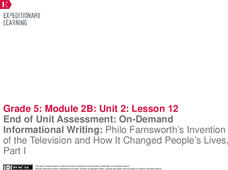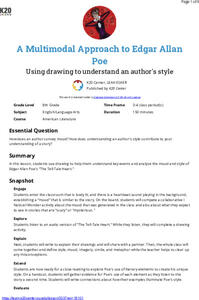EngageNY
Performance Task: Final Draft of the Newspaper Article
It's time for the grand finale! Scholars complete the final draft of their newspaper articles for the End of Unit 3 Assessment. They share their article with a classmate for peer critique. After considering all feedback and including a...
ReadWriteThink
Captioning the Civil Rights Movement: Reading the Images, Writing the Words
Scholars boost their knowledge of the Civil Rights Movement with a lesson that challenges writers, readers, and historians to analyze primary sources and caption their observations. By way of reading, writing, discussion, independently,...
EngageNY
Drafting Individual Readers Theater Scripts for a Specific Scene: Narrowing Text for our Readers Theater Scripts
Let's focus. In small groups, writers narrow text selections to produce a narrative script based on the novel Esperanza Rising by Pam Muñoz Ryan. Next, pupils plan their reader's theater scripts based on the text.
EBSCO Industries
Music and Poetry
Song lyrics, like poems, are meant to be heard. After examining the literary devices in several poems, scholars examine the lyrics of popular songs and identify the sound devices and the figurative language writers use to create the...
EngageNY
End of Unit Assessment: On-Demand Informational Writing: Philo Farnsworth’s Invention of the Television and How It Changed People’s Lives, Part I
On-demand isn't just for TV anymore. Writers complete their end of the unit assessment with an on-demand writing task. They read the article Television and answer questions about the gist, vocabulary, and content. They then complete a...
National Endowment for the Humanities
Literary Genres in “Moby-Dick”
Moby Dick is more than a whale of a tale narrated by Ishmael. A lesson studying Herman Melville's classic novel asks readers to examine the different genres the author weaves into his story. Instructors model how to conduct a stylistic...
National Endowment for the Humanities
The Glass Menagerie: Impact of Expressionism
Young scholars are challenged to write a realistic analysis of Tennessee Williams' nonrealistic memory play, The Glass Menagerie. Writers use the evidence gathered on their worksheets to craft an effective thesis and concluding statement...
ReadWriteThink
Persuasive Essay: Environmental Issues
Young environmentalists learn how to craft a persuasive essay about an environmental issue they consider important. After studying the components of a persuasive essay and examining a student model, writers brainstorm possible topics and...
PBS
Exploring Identity and Intersectionality in Poetry
Just as Kermit the Frog notes, "It isn't easy being green!" it isn't easy occupying "multiple Identity spaces." Class members read and discuss poems by writers detailing what it is like when their identities are "oppressed."
Facing History and Ourselves
Three Good Things
A "Three Good Things" routine asks participants to sit quietly and reflect on three positive things in their world: family, school, community, or the world at large. After journaling about one that feels most important right now, writers...
K20 LEARN
A Multimodal Approach To Edgar Allan Poe Using Drawing To Understand An Author's Style
True! Poe's "The Tell-Tale Heart" makes readers nervous. But how? Young scholars create a drawing while listening to a reading of Poe's eerie tale to understand how writers create the mood of their stories and what their writing style...
K20 LEARN
"The Lady, Or The Tiger?" Which Do You Choose?: Internal and External Conflict
"How come there's no ending?" After a close reading of Frank R. Stockton's tale "The Lady, or the Tiger?" in which scholars examine each of the main characters' conflicts and motivations, writers craft their own ending using textual...
K20 LEARN
Allow Me To Introduce Myself: Writing A Letter Of Introduction
"Who am I?" is not only a great philosophical question that requires a lot of reflection but is also at the heart of a letter of introduction. The challenge, of course, is figuring out where to start. Middle schoolers get a little help...
K20 LEARN
Blackout Poetry: Re-Envisioning Writing
Introduce young poets to Blackout Poetry. Much like Found Poems, Blackout Poetry challenges scholars to rethink the process writers may use to craft their poems. After watching a short video in which poet Austin Kleon describes his...
K20 LEARN
Ethos, Logos, Pathos: Persuading Your Audience
Ethics, emotion, reason—scholars investigate advertisers' persuasive techniques to attract buyers. After examining the techniques used in infomercials, writers craft a persuasive essay on a topic of their choice.
K20 LEARN
Growing Themes
The theme of a work is not a single word! Rather it is a statement that reflects what a writer believes or wants readers to understand about a topic or subject. Here's a short, but powerful lesson that utilizes passages from The...
Other popular searches
- Freedom Writers
- Writers Workshop
- Writers Notebook
- Writers Craft
- Freedom Writers Movie
- Writers Craft Story Starters
- Natural History Writers
- Writer's Workshop
- Writers Block
- Freedom Writers Diary
- Women Writers
- Beat Writers

















